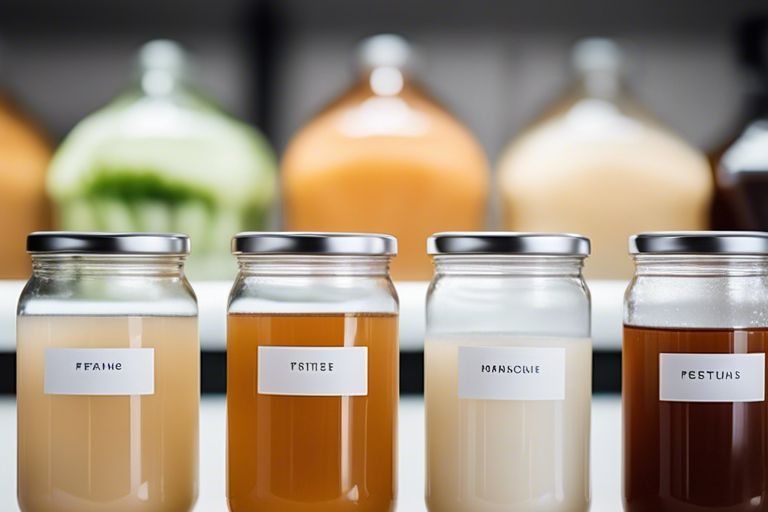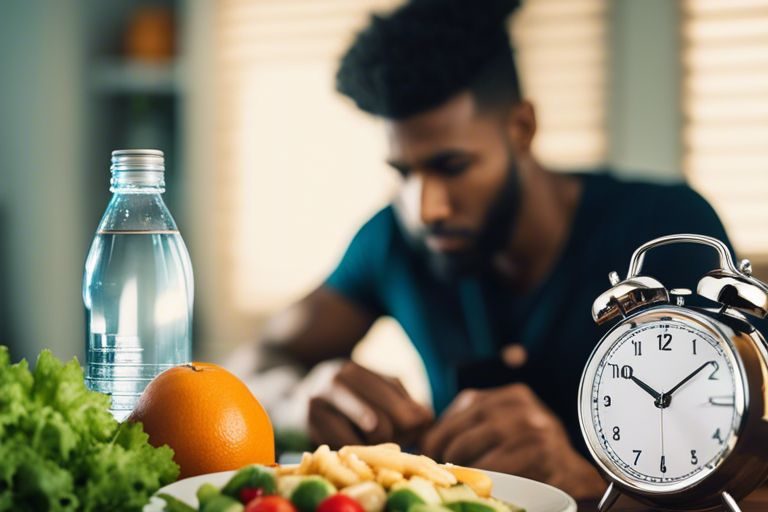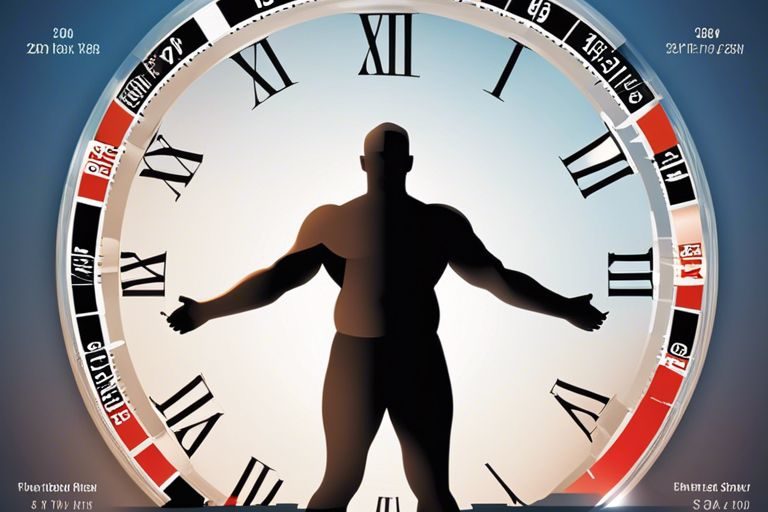
Water holds the key to successful intermittent fasting, as it is crucial for staying hydrated during fasting periods. While coffee and tea are popular choices due to their minimal calorie content, it is important to avoid adding sugar, cream, or any other additives that could break your fast. Additionally, natural fruit juices and smoothies should be consumed with caution due to their high sugar content. Opting for unsweetened beverages like sparkling water or herbal tea can help curb hunger cravings without compromising your fasting goals. Note, the key is to choose zero-calorie or low-calorie drinks that won’t disrupt your fasting state.
Key Takeaways:
- Water is imperative: Water is a must-have during intermittent fasting to stay hydrated and support various bodily functions.
- Black coffee and tea are okay: Both black coffee and unsweetened tea are great options to consume during fasting periods as they are low in calories and can help curb hunger.
- Avoid sugary beverages: Sugary drinks such as soda, fruit juices, and energy drinks should be avoided as they can spike insulin levels and break your fast.
- Non-caloric beverages are safe: Opt for non-caloric beverages like sparkling water, herbal teas, and black coffee to stay hydrated without breaking your fast.
- Be mindful of your body: Listen to your body’s signals and adjust your drink choices if you experience any negative effects while fasting.

Types of Beverages Allowed
Little attention is paid to the beverages consumed during intermittent fasting, but they can have a significant impact on the success of your fasting regimen. It’s necessary to choose the right drinks that won’t break your fast and will help you stay hydrated and energized throughout the fasting period.
| Zero-Calorie Drinks | Low-Calorie Drink Options |
| Coffee | Green tea |
| Plain tea | Black coffee |
| Carbonated water | Herbal tea |
| Apple cider vinegar | Vegetable juice |
| Water | Coconut water |
Zero-Calorie Drinks
Types of zero-calorie beverages that are allowed during intermittent fasting include plain water, black coffee, plain tea, carbonated water, and apple cider vinegar. These drinks do not contain any calories or sugar, making them safe to consume during fasting hours. They can help keep you hydrated and curb hunger without breaking your fast.
When choosing zero-calorie drinks, it’s important to opt for options that are truly calorie-free and do not contain any additives or sweeteners that could spike your insulin levels. Stick to unsweetened varieties to ensure you are not disrupting the fasting process.
Low-Calorie Drink Options
Options for low-calorie drinks that can be consumed during intermittent fasting include green tea, black coffee, herbal tea, vegetable juice, and coconut water. These beverages contain minimal calories and can provide some nutritional benefits while still keeping you within your fasting window.
For instance, green tea is rich in antioxidants and can help boost metabolism, while coconut water is a natural electrolyte source that can replenish nutrients during fasting. These drinks can add variety to your fasting routine while supporting your health goals.
Assume that you always check the labels of low-calorie drinks to ensure they do not contain added sugars or artificial sweeteners that could affect your fasting results.
Tips for Staying Hydrated
Once again, staying hydrated is crucial during intermittent fasting. Proper hydration not only supports overall health but can also help minimize feelings of hunger and fatigue that may arise during fasting periods.
Here are some helpful tips to ensure you stay hydrated while practicing intermittent fasting:
- Drink plenty of water throughout the day.
- Opt for herbal teas or black coffee during fasting periods.
- Include electrolytes in your hydration routine, especially if you are exercising.
This will help maintain hydration levels and support your body’s functions during fasting.
Timing Your Fluid Intake
To optimize hydration during intermittent fasting, it’s imperative to pay attention to when you consume fluids. Focus on drinking water consistently throughout the day, especially during non-fasting periods.
By staying hydrated regularly, you can help sustain energy levels and avoid dehydration, which is crucial for overall well-being.
Flavoring Your Water
Timing is key when it comes to flavoring your water during intermittent fasting. While plain water is the best choice for hydration, you can add a slice of lemon or cucumber for a refreshing twist.
Tips: Avoid adding sugar or artificial sweeteners to your water to prevent breaking your fast inadvertently.
This way, you can enhance the taste of your water without compromising the benefits of intermittent fasting.
Step-by-Step Guide to Implementing Drinks in Your Fast
Your intermittent fasting journey can be greatly enhanced by strategically including various beverages during your fasting window. Here, we provide a step-by-step guide to help you effectively incorporate drinks into your fasting routine.
| Step 1 | Identify fasting-friendly beverages such as water, black coffee, green tea, and herbal teas. |
| Step 2 | Gradually introduce other low-calorie or zero-calorie drinks like sparkling water or apple cider vinegar mixed with water. |
Evaluating Beverages for Fasting Compatibility
To ensure that the beverages you consume during fasting do not break your fast, consider the caloric content, impact on insulin levels, and potential effects on hunger. Water, black coffee, green tea, and herbal teas are generally safe options that will not disrupt your fasting state. On the other hand, sweetened beverages, dairy-based drinks, or anything containing calories should be avoided.
To determine if a beverage is compatible with your fasting regimen, read the nutrition label for calorie content and be cautious of hidden sugars or additives. Experiment with different drinks to see how they affect your energy levels, hunger cues, and overall fasting experience.
How to Introduce Drinks into Your Fasting Window
Beverages play a crucial role in staying hydrated and managing hunger during fasting periods. Start by incorporating one fasting-friendly beverage at a time and observe how your body responds. Gradually increase the variety of drinks you consume to keep your fasting routine interesting and sustainable.
Plus, be mindful of your caffeine intake and how it may affect your sleep quality or stress levels. Listen to your body’s signals and adjust your beverage choices accordingly to optimize your fasting journey.
Factors to Consider When Choosing Drinks
For those following an intermittent fasting protocol, selecting the right beverages plays a crucial role in maintaining the fasting state and reaping the benefits. Here are some factors to consider when choosing what to drink during your fasting window:
- Impact on Insulin Levels: Certain drinks, such as black coffee or water, have minimal impact on insulin levels, making them ideal choices during fasting periods. To learn more about the impact of different drinks on insulin levels, check out What Can You Consume Whilst Fasting? Drinks, Food, And …
- Effects on Appetite and Satiety: Some beverages may help curb hunger pangs and keep you feeling full, such as green tea or bone broth. Understanding how different drinks affect your appetite and satiety can enhance your fasting experience.
Impact on Insulin Levels
Impact on insulin levels is a critical factor to consider when selecting drinks during intermittent fasting. Consuming beverages that cause insulin spikes can break your fast and hinder the fat-burning process. Opting for zero-calorie drinks or those that do not stimulate insulin release can help you stay in a fasted state and maximize the benefits.
Effects on Appetite and Satiety
Appetite regulation is key during fasting periods, making it necessary to choose drinks that help control hunger and promote satiety. Certain beverages, like apple cider vinegar or herbal teas, can aid in managing appetite and keeping cravings at bay. Understanding how different drinks impact your appetite and satiety levels can assist you in navigating through fasting windows successfully.
Choosing the right drinks during intermittent fasting can significantly influence your fasting experience and overall results. Prioritizing beverages that have minimal impact on insulin levels and help control appetite can help you stay on track and achieve your health goals. Any decisions should align with your desired fasting outcomes and enhance the benefits of your fasting protocol.

The Pros and Cons of Drinking Different Beverages
To make an informed decision about what to drink during intermittent fasting, it’s necessary to consider the pros and cons of different beverages. Here is a breakdown of the benefits and drawbacks of some common options:
| Coffee and Tea |
|
| Water |
|
| Artificial Sweetened Beverages |
|
Coffee and Tea During Fasting
Coffee: During fasting, black coffee is a popular choice due to its minimal calorie content. It can help increase alertness and may even boost metabolism. However, excessive consumption can lead to stomach irritation and potentially dehydrate the body.
Tea: Herbal teas or plain green tea are other options to consider during fasting. They offer hydration and can provide antioxidants that support overall health. Just be cautious with teas containing added sugars or milk that may break your fast.
Artificial Sweeteners and Their Impact
Sweeteners: Artificial sweeteners are often used in beverages as a sugar substitute. While they are low in calories and provide a sweet taste without affecting blood sugar levels, some studies suggest they may increase cravings for sweet foods and beverages. Additionally, there are concerns about potential negative health effects related to artificial sweeteners.
Summing up
Choosing what to drink during intermittent fasting can play a crucial role in your success. Opt for zero-calorie beverages like water, black coffee, herbal tea, and sparkling water to stay hydrated and curb hunger. Remember to listen to your body and adjust based on how you feel. For a more in-depth guide on intermittent fasting, check out Intermittent Fasting 101 — The Ultimate Beginner’s Guide.
FAQ
Q: What can you drink during intermittent fasting?
A: During intermittent fasting, you can drink water, black coffee, green tea, herbal tea, and other non-caloric beverages to stay hydrated and curb hunger.
Q: Can you drink alcohol during intermittent fasting?
A: It is best to avoid alcohol during intermittent fasting as it can disrupt your fasting state and hinder your progress. Opt for non-alcoholic beverages instead.
Q: Is it okay to have milk or cream in your coffee while fasting?
A: Adding milk or cream to your coffee can break your fast as they contain calories. Stick to plain black coffee to keep your fast intact.
Q: Can you drink diet soda during intermittent fasting?
A: Diet soda is calorie-free, but the artificial sweeteners in it can still trigger an insulin response, potentially breaking your fast. It’s best to avoid it during fasting periods.
Q: What about bone broth or clear broth while fasting?
A: Bone broth or clear broth can be consumed during fasting periods as they are low in calories and can help curb hunger while providing some nutrients.
Q: Can you drink fruit juice while intermittent fasting?
A: Fruit juice is high in sugar and calories, which can spike your insulin levels and break your fast. It’s advisable to stick to water or herbal tea instead.
Q: Is it important to stay hydrated during intermittent fasting?
A: Yes, staying hydrated is crucial during intermittent fasting to support overall health and help control hunger. Drink plenty of water throughout the fasting period.







